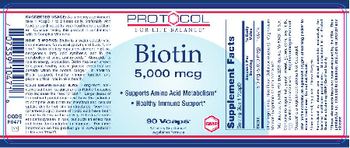Biotin 5,000 mcg
This product is no longer available
This product was taken off the market by the manufacturer around Nov 30, 2016

Product Type
supplement
Packaging Size
Serving Size
1.0 Vcap(s)(R),
UPC
707359104716
Ingredients
| biotin | 5.0 | mg |
Description
Vegetarian Adult (18 - 50 Years) Sugar Free Gluten Free Dairy Free Vegan NP A Dietary Supplement For more information on this product go to www.protocolforlife.com/P0471 Formulated by doctors and clinical scientists exclusively for licensed healthcare practitioners. Manufactured in an A-rated Good Manufacturing (GMP) Certified facility. HOW IT WORKS: Biotin is a water-soluble vitamin necessary for normal growth and body function. Biotin is a key regulatory element in gluconeogenesis, fatty acid synthesis, and in the metabolism of some amino acids. Alongside its role in energy production, Biotin has been shown to support healthy serum glucose levels that are already within the normal range. In addition, Biotin supports healthy immune function and plays a critical role in skin health. Please Recycle. • Supports Amino Acid Metabolism
• Healthy Immune Support CODE P0471 V3 Store in a cool, dry place. GMP SUGGESTED USAGE: As a dietary supplement, take 1 Vcap(R) 1 to 2 times daily, preferably with food, or as directed by your healthcare practitioner. Consider taking this product in combination with B-Complex Vitamins.
Formulation
Contains no sugar, salt, yeast, wheat, gluten, corn, soy, milk, egg, shellfish or preservatives. Vegetarian Formula Vegetarian/Vegan Product.
Precautions
This bottle contains an Ageless(R) oxygen absorbing packet to ensure freshness. Do not eat Packet. CAUTIONS/INTERACTIONS: Long-term anticonvulsant (anti-seizure) and antibiotic therapies may increase the need for biotin. Large doses of the nutrient pantothenic acid have the potential to compete with biotin for intestinal and cellular uptake due to their similar structures. Very high (pharmacologic) doses of lipoic acid have been found to decrease the activity of biotin-dependent carboxylases in rats, but such an effect has not been demonstrated in humans.